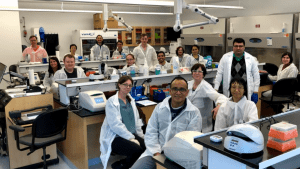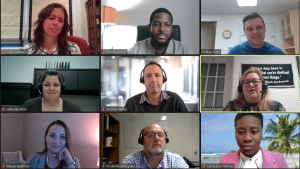
Frederick National Labs Attract Entrepreneurs and Collaborators Seeking Leading-Edge Biomedical Technologies
Tech Transfer Event Attracts Leading Researchers, Postdocs and Investors from Across the BioHealth Capital Region and Beyond
June 18, 2019
The National Cancer Institute (NCI) and The Frederick National Laboratory for Cancer Research (FNLCR) recently hosted the third annual Technology Showcase at The FNLCR’s Advanced Technology Research Center (ATRF) in Frederick, Maryland. The event provided industry thought leaders, inventors and entrepreneurs a platform to network, showcase their technologies, and learn more about the tech transfer process, starting a new business and various fundraising strategies.
The annual event, sponsored by The Frederick County Office of Economic Development, The City of Frederick Office of Economic Development and TEDCO, drew a large, enthusiastic crowd of over 200 attendees from the BioHealth Capital Region (BHCR) and beyond.
Leonard Freedman, Ph.D. and Chief Science Officer, FNLCR, opened the event by emphasizing his commitment to the ongoing mission of the Technology Transfer Showcase: “When this event started three years ago, the idea was for the Frederick National Lab and the NCI to showcase mature technologies ready for licensing and commercialization. But at the same time it was to promote the capabilities of the labs and to foster new collaborations, interactions and partnerships…we keep coming back every year even stronger and more excited to showcase the tech we have in Frederick.”
Keynote speaker Rich Bendis, CEO of BioHealth Innovation (BHI), officially kicked off the Technology Showcase by highlighting Frederick County’s important and expanding contributions to the wider BHCR biohealth cluster: “Frederick is business friendly, has a skilled workforce, is strategically located…and has the infrastructure to support companies from incubation to acceleration…FITCI (Frederick Innovative Technology Center) has become one of the most active and best incubators and accelerators in the state.”
Frederick County also has over 100 life science and biotech related entities. A recent video created by Frederick County and Frederick City’s offices of economic development truly captures the spirit of Bendis’ commentary on the importance of Frederick County’s bioscience industry.
NCI has one of the biggest Small Business Innovation (SBIR) and Small Business Technology Transfer (STTR) programs in the United States, generating $9.1 Billion in total sales to date of products and services resulting from the SBIR/STTR phase II awards and $26.1 Billion in total nationwide economic output (NCI SBIR Impact Study).
Recent NCI tech transfer success stories include Kite Pharmaceuticals, a successful T Cell therapeutics company that recently announced its plans to build a manufacturing site in Frederick County, Maryland, that was founded on technology transferred out of an NCI lab; Avelumab, commercially known as BAVENCIOⓇ, is a pioneering Merkel cell carcinoma treatment developed as part of a co-development agreement between EMD Serono, the biopharma division of Merck KGaA, and the NCI Tech Transfer Center; and Gaithersburg, Maryland-based miRecule, Inc. is an early-stage biopharmaceutical company focused on developing microRNA-based therapies for drug-resistant cancers that was spun out of NCI.
To say that the NIH, NCI and FNLCR are wellsprings of technological and scientific innovation is an understatement.
This year’s NCI Technology Showcase did not disappoint in its effort to showcase the groundbreaking research being done by regional scientists and aspiring entrepreneurs. Two Technology Presentation Sessions featured research presentations on a wide array of new technologies, ranging from nanoparticles and insect cell technologies to synthetic lipopeptide inhibitors and renal carcinoma biomarkers, to name a few.
Postdoctoral students participating in Technology Transfer Ambassadors Program (TTAP) displayed their posters outside of the main meeting hall and had an opportunity to pitch their technologies to potential licensing and collaborative partners.
New to this year’s showcase were education sessions focused on funding strategies, which represented a shift in approach to include entrepreneurship resources to scientists looking to transform their tech into startup businesses.
“Making Your Company Attractive to Equity Investors”, moderated by Martin Rosendale, CEO of the Maryland Tech Council, and “Non-dilutive Sources of Funding to Commercializing Technology”, moderated by Darryl Sampey, CEO of Frederick-based BioFactura, were two education sessions designed to help scientist-entrepreneurs succeed in moving their technology into the market.
Other educational sessions focused on business strategy included “Partnering with the NCI and FNLCR to Benefit Your Pipeline and Bottom Line”, moderated by Michael Salgaller, Ph.D., Invention Development and Marketing Unit Supervisor with NCI and the Tech Transfer Center (TTC), and “Leveraging Startup Accelerators for Technology Licensing and Commercialization,” moderated by Michael Binko, President and CEO of Startup Maryland.
Each educational session panel featured important thought leaders and experts sharing useful tips and critical insights that will help bridge the gap between the BHCR region’s “unrivaled assets” and its “unfulfilled commercialization promise”, as noted by Bendis in his keynote opening.
Throughout the day, science converged with business and the next generation of scientists and veteran researchers mingled with potential partners and investors, laying the groundwork for the commercialization of future life-changing treatments and cures for cancer patients and those suffering from the world’s rarest diseases.
- About the Author
- Latest Posts
Steve brings nearly twenty years of experience in marketing and content creation to the WorkForce Genetics team. He loves writing engaging content and working with partners, companies, and individuals to share their unique stories and showcase their work. Steve holds a BA in English from Providence College and an MA in American Literature from Montclair State University. He lives in Frederick, Maryland with his wife, two sons, and the family dog.





